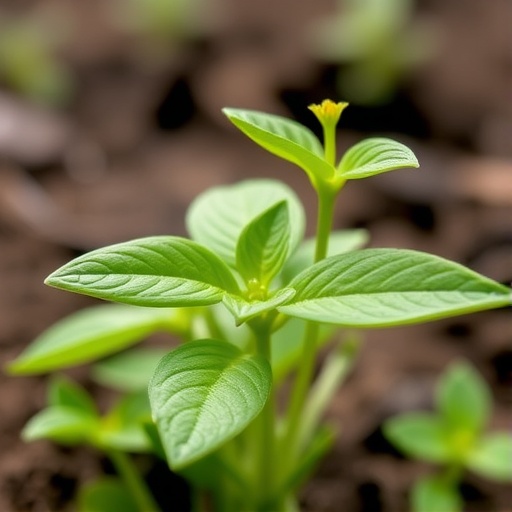In a striking development in plant pathology and genetics, researchers have elucidated the important role of the AtLOX2 gene in Arabidopsis thaliana in combating the notorious pathogen Xylella fastidiosa subsp. fastidiosa. This research adds a crucial layer of understanding to how plants interact with pathogenic threats, opening new avenues for scientific inquiry and potential agricultural applications. As global agriculture grapples with increasing threats from pathogens, this study’s findings could have profound implications for managing diseases in economically significant crops.
AtLOX2, or Arabidopsis lipoxygenase 2, is a gene that has been under investigation for its implications in plant defense mechanisms. The researchers, led by Gramegna et al., delved deep into the genetic and biochemical pathways activated in Arabidopsis when confronted with the aggressive behavior of Xylella fastidiosa. This bacterium, known for causing devastating diseases in various plants, including oliver trees and grapevines, poses a significant threat to global agricultural sectors. Understanding the genetic defenses a plant can mount against such pathogens is critical for developing resistant crop varieties.
The team utilized a variety of methodologies to study the interaction between AtLOX2 and Xylella fastidiosa. Their findings indicate that AtLOX2 modulates the plant’s defensive responses, leading to the accumulation of defensive compounds that hinder the growth of the bacterium. This proactive approach by the plant highlights the intricate biological arms race between plants and pathogens and showcases nature’s ingenuity in developing defense mechanisms at the molecular level.
The methodology employed by the researchers included both genetic manipulation and biochemical assays. They created Arabidopsis mutants with different expression levels of AtLOX2 to gauge how variations affect plant resilience. Their results were telling; the plants expressing higher levels of AtLOX2 showed a marked decrease in bacterial growth. This demonstrates a potential genetic target for enhancing plant resistance against such pathogens, which is critical as food security becomes a pressing issue worldwide.
One of the noteworthy aspects of the study is its timing relative to the outbreak of Xylella fastidiosa worldwide. The emergence of this pathogen has caused considerable economic damage, and understanding its interaction with host plants could lead to better management practices. The research underscores the importance of investing time and resources into plant genetic research, as such knowledge could protect against future outbreaks.
Furthermore, the study provides insight into the biochemical pathways that are activated upon bacterial infection. AtLOX2 contributes to the synthesis of signaling molecules like jasmonic acid, which is known to initiate defensive responses in plants. The research establishes a direct connection between lipoxygenase activity and plant immunity, providing a potential cornerstone for breeding programs aimed at increasing resilience to bacterial pathogens.
The implications of these findings stretch beyond Arabidopsis thaliana. The insights garnered from the interaction between AtLOX2 and Xylella fastidiosa can potentially be applied to other plants, especially those that are economically important and frequently afflicted by bacterial infections. This could lead to breakthroughs in the development of crops that are resilient to bacterial blight, ultimately reducing reliance on chemical treatments and promoting sustainable agriculture practices.
In their discussion, the authors emphasize the urgent need for further research on plant-pathogen interactions. While this study illuminates the role of AtLOX2, many other genes and pathways likely contribute to the complex defense mechanisms plants use to combat pathogens. Future studies could focus on unraveling these pathways, creating a comprehensive understanding that could assist agronomists and breeders in cultivating more resilient crops.
The researchers also underscore the need for interdisciplinary approaches that combine genetic research with practical agricultural strategies. Collaboration between geneticists, plant pathologists, and agronomists could lead to innovative solutions that enhance crop resilience while ensuring food security amidst changing climatic conditions and increasing pathogen pressures.
In summation, Gramegna et al.’s research on the AtLOX2 gene provides a compelling glimpse into the dynamic battles occurring within plant cells as they fend off harmful pathogens like Xylella fastidiosa. This work not only sheds light on the fundamental mechanisms of plant immunity but also underscores the pressing need for continued investigation in plant science. As the global agricultural landscape faces unprecedented challenges from pathogens, understanding and leveraging plant defense mechanisms will be crucial in safeguarding food supplies for future generations.
As researchers continue to expand our understanding of plant-pathogen dynamics, it becomes clear that innovations in crop protection will play an essential role not only in maintaining the health of crops but also in constructing a sustainable future for agriculture. The findings from this study are a step forward in this vital field, paving the way for new strategies that harness the power of plant genetics to enhance food security.
Overall, this work serves as a reminder that the relationship between plants and their pathogens is complex and multifaceted. It highlights the continuous need for research and the exploration of genetic pathways that can empower plants to better resist the onslaught of diseases that threaten them. The integration of this knowledge into agricultural practices could indeed mark a turning point in the fight against plant diseases, affirming the relevance and urgency of ongoing research in this area.
Subject of Research: The role of AtLOX2 gene in plant defense against Xylella fastidiosa in Arabidopsis thaliana.
Article Title: AtLOX2 plays a role in contrasting the growth of Xylella fastidiosa subsp. fastidiosa Temecula1 in the model Arabidopsis thaliana.
Article References:
Gramegna, G., Beccaccioli, M., Pucci, N. et al. AtLOX2 plays a role in contrasting the growth of Xylella fastidiosa subsp. fastidiosa Temecula1 in the model Arabidopsis thaliana. Discov. Plants 2, 233 (2025). https://doi.org/10.1007/s44372-025-00320-2
Image Credits: AI Generated
DOI: 10.1007/s44372-025-00320-2
Keywords: AtLOX2, Xylella fastidiosa, Arabidopsis thaliana, plant defense mechanisms, plant genetics, sustainable agriculture, plant-pathogen interaction.




